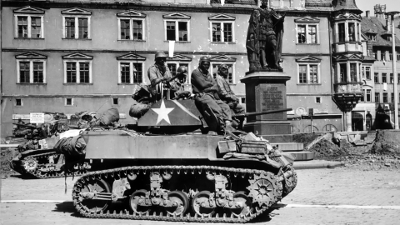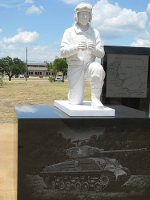|
Black Panther Star to Chronicle Real-life Panthers' War Story
April 11, 2018
In a case of art imitating life, one of the stars of the superhero blockbuster Black Panther will serve as a producer on a new movie about some real-life Black Panthers, a World War II tank battalion. Michael B. Jordan, who played one of the contenders for the throne of Wakanda in the film, is on board as a producer for a film to be titled The Liberators. Whether he stars in the film remains to be seen. Like the Tuskegee Airmen, the 761st was made up almost entirely of African-Americans. The 761st was formed in 1942 at Camp Claiborne, in Lousiana, and trained there and at Fort Hood, in Texas. Among the 36 officers of the initial 700-strong battalion was Jackie Robinson, who would go on later to become the first African-American in Major League Baseball. Robinson did not ship out with the 761st, however, because he was court martialed for refusing to give up his seat on a military bus to a white serviceman. (His battalion commander, Paul Bates, refused to sign off on the court martial, but another commander did so; Robinson then left the Army.) The battalion landed on Omaha Beach in October 1944, attached to the XII Corps' 26th Infantry Division, part of General George Patton's Third Army. The 761st participated in four major Allied campaigns, including breaking through Germany's vaunted Siegfried Line and then accompanying Patton to the Battle of the Bulge, Germany's last-ditch attempt to break out from the encircling Allied forces. The 761st were also some of the first American forces to link up with the westward-moving Russian Army, at Austria's Enns River. In May 1945, in the waning days of the war, the 761st helped liberate Gunskirchen, a subcamp of Mauthausen, a concentration camp in Austria. A woman wrote a poem titled "The Black Messiah," about the soldier who saved her. Somewhere along the way, the 761st adopted the name Black Panthers and the slogan "Come out fighting!" The 761st as a unit received 391 decorations for heroism: 11 Silver Stars, 69 Bronze Stars, and 311 Purple Hearts. The U.S. Military was still segregated, as was much of the United States, at the end of the war. The Black Panthers returned home with a large pile of medals but still faced skin-color-based discrimination in their daily lives. President Harry S. Truman desegregated the Military in 1948, but this didn't help the Panthers veterans in society at large. They would have to wait for significant civil rights legislation in the 1960s and, in many cases, longer. President Jimmy Carter in 1978 issued for the Panthers a Presidential Unit Citation. President Bill Clinton in 1997 presented the Medal of Honor to former Panther Vernon Baker and to the families of six of his fellow Panthers who had since died. A monument to the Black Panthers, unveiled in 2005 and featuring Medal of Honor recipient Ruben Rivers, now stands at Fort Hood. |
Social Studies for Kids |
Social Studies for Kids
copyright 2002–2019
David White







